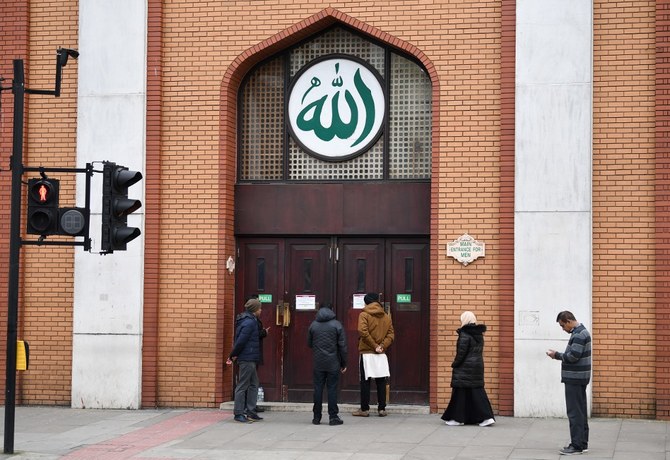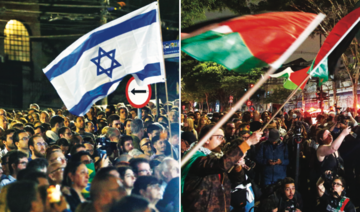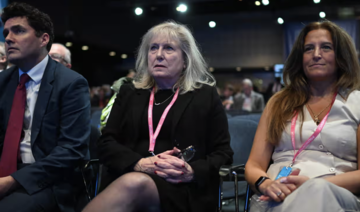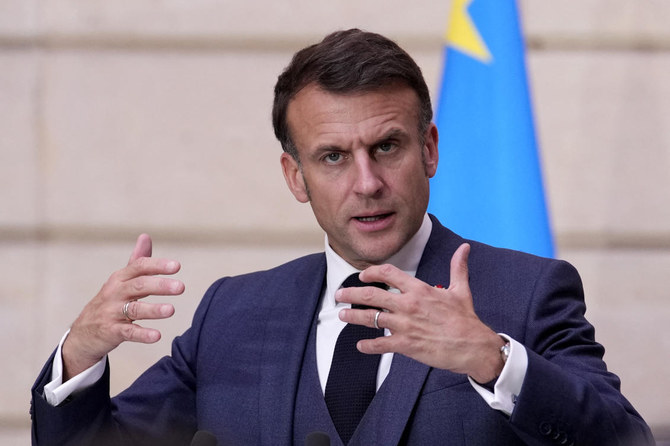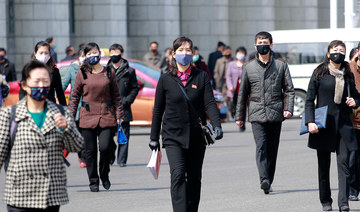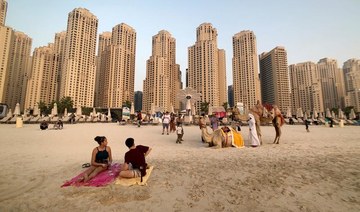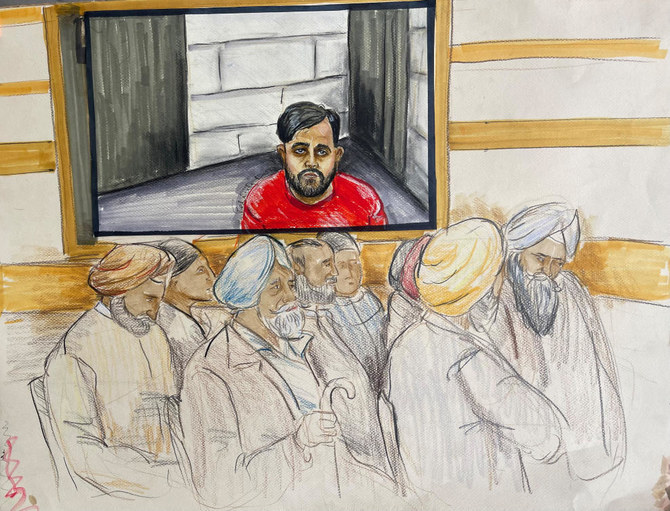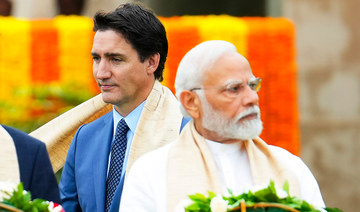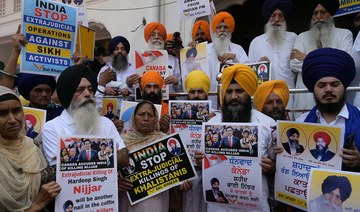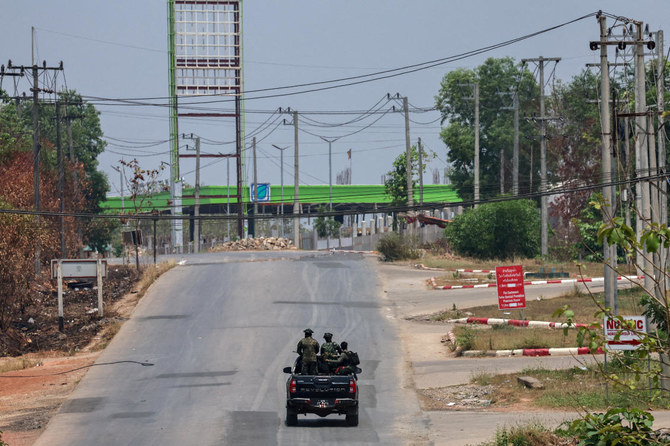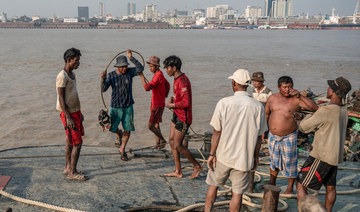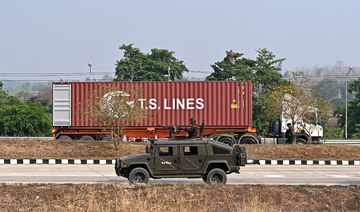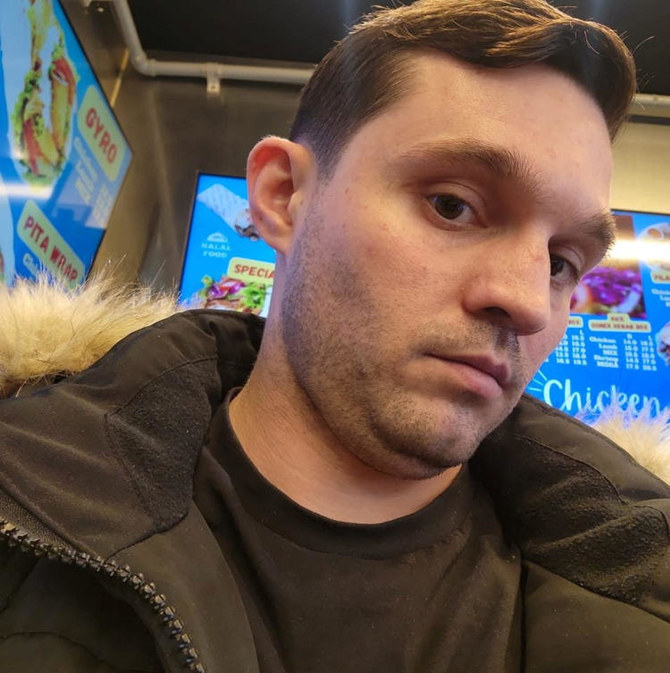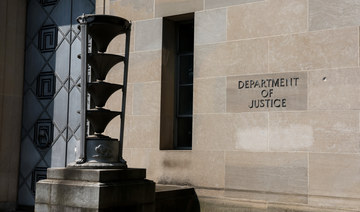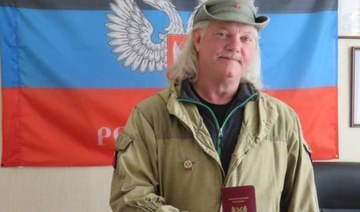LONDON: Muslims in the UK are observing Islamophobia Awareness Month against the backdrop of the conflict in Gaza and “an exceptionally hostile political environment,” the Muslim Council of Britain said on Wednesday.
The negative political climate is “only further exacerbated by divisive comments from senior politicians such as the home secretary,” Suella Braverman, an MCB spokesperson told Arab News.
Braverman has described pro-Palestinian demonstrators who take to the streets of the UK in support of a ceasefire in Gaza as taking part in “hate marches.” And in a letter to senior police officers, she said that waving a Palestinian flag or chants that advocate freedom for Arabs in the region could constitute a criminal offense.

Demonstrators take part in a protest inside Charing Cross station following the “London Rally For Palestine,” in central London on Nov. 4, 2023. (AFP)
There has been an increase in violence against British Muslim communities in the past month, since the war in Gaza began, the MCB said, with police recording a 140 percent increase in Islamophobic offenses in London alone.
“Over the course of the now month-long attack on the Gaza Strip, we have seen a surge of hate crime at home,” the MCB spokesperson said.
“We have also seen Islamophobic attacks across the UK, including the attempted arson on an Oxford mosque in which the perpetrator threw a petrol can at the mosque that had ‘IDF’ (the abbreviation for Israel Defense Forces) scrawled over it; a man attacking a Muslim woman with a concrete slab in broad daylight; and alcohol being poured over Muslim worshippers praying at a protest.”
The head of London’s Metropolitan Police, Sir Mark Rowley, has said there is scope for “sharper” laws to deal with extremism and that he would support a review of the legal definition of the word, after his force was criticized for the way it has handled ongoing weekly pro-Palestinian protests in London.

Britain’s Home Secretary Suella Braverman speaks with Metropolitan Police Commissioner Mark Rowley (R) and London Mayor Sadiq Khan (L). (File/AFP)
According to The Observer newspaper, government officials have drawn up proposals to broaden the definition of extremism to include anyone who “undermines” the country’s institutions and values.
Civil rights groups fear that such a move would “criminalize dissent” and dramatically suppress freedom of expression. There is concern that a broader legal definition could be used to crack down on freedom of speech and penalize legitimate organizations and individuals.
Sal Naseem, 47, is an expert on inclusive culture and the former regional director for London at the Independent Office for Police Conduct. He has actively campaigned against Islamophobia after witnessing it first-hand while growing up in southwestern Scotland.
Any proposal that could limit free speech must be developed in accordance with the laws on equality and must not legally discriminate against any particular group, he said.
“Muslims are very much protected under the equality law in the UK, and what we are seeing now as a result of the conflict in Israel and Palestine is the rising tide of Islamophobia being peddled out, particularly in the right-wing media,” Naseem said, adding that narratives that routinely demonize Muslims are being touted and explored.
“But the consequences of that are that there are nearly 4 million Muslims that live in England, and you’re almost treating them as a monolith; you’re looking to demonize Muslims and I think, particularly at this time, we have to fight against anything which looks to divide us, to marginalize us.
“Islamophobia is one of those forms of permissive discrimination, which is sadly being given a sheen of respectability in this country. And if you look at the proposals around extremism, I'm sorry, there are shadows of McCarthyism in that and we have to really, really be guarded and careful that terrible events in the Middle East are not used to limit freedoms in this country.”
Although many Muslims are afraid speak out currently for fear of being targeted and other repercussions, Naseem said they are entitled to protection under the law if they are being treated unfairly because of their faith and should report any Islamophobic incidents.
“It’s not an acceptable thing and the law very clearly states that,” he added. “So where we are seeing these things, we need to report them, we need to complain about them through the mechanisms that are available. They are the only mechanisms there but we need to have confidence in taking these things through the systems that we have.”
Naseem said that the nature of Islamophobia has changed over the years and is now more indirect than it used to be, but it still exists even if it is harder to report.
“The experience I had of general discrimination, and Islamophobia in particular, was pretty acute,” he said. “It was open hatred, vitriol and violence. It wasn’t from everybody, but from a minority of people it was opened hatred.
“These days, Islamophobia and how it’s affected me has been much more subtle. It’s there but it’s in terms of ‘othering’ comments, trolls on social media, or marginalizing organizational processes and cultures.
“It’s not overt these days, or very rarely will it be overt. But actually, when it’s not it’s much harder to deal with.”
Zaheer Ahmad, 47, the CEO of EqualityX, an organization that celebrates outstanding Muslim talent and champions the achievements of inclusive Muslim employers, said that although Muslims have a role to play in combating Islamophobia, it’s not fair to put the onus entirely on them.
“I look at this from the lens of diversity, equity and inclusion, which is my area of expertise,” he said. “I don’t think the sole responsibility to combat Islamophobia rests with Muslim communities. We wouldn’t ask women to take on the responsibility of tackling sexism, or ethnic minorities to eradicate racism.
“Islamophobia is a societal issue and must be tackled through concerted and coordinated efforts by all of us, Muslims and non-Muslims.
“Yes of course, there is a role Muslims can play. For example, they can play an active part in educational efforts to help increase awareness of the lived experiences of Muslims and engage with a wide range of stakeholders to influence decision-making to build alliances. They can also proactively report incidents of Islamophobia to the relevant authorities.”
Islamophobia Awareness Month, which takes place in the UK in November each year, was founded in 2012 with the aim of showcasing the positive contributions of Muslims to society, as well as making people more aware of Islamophobic behavior.



